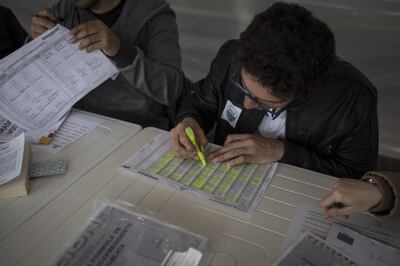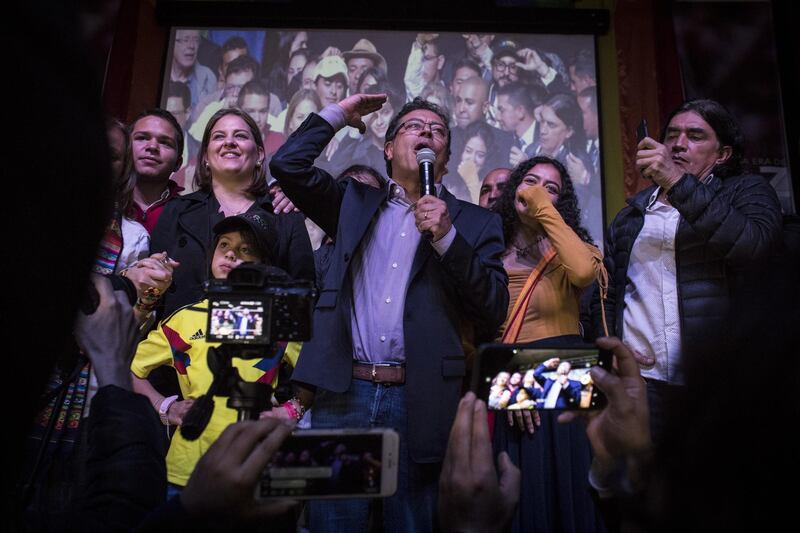Reuters Colombia headed for its most divisive presidential race in decades after right-winger Ivan Duque won Sunday's first-round vote, triggering a runoff with leftist Gustavo Petro that could upset a historic peace deal or derail business-friendly reforms.
It is the first time in Colombia's modern history that an openly leftist candidate has reached the second round of a presidential vote, a prospect that unnerved some investors in Latin America's fourth-largest economy.
Duque, a 41-year-old former official of the Washington-based InterAmerican Development Bank, was the convincing winner of Sunday's ballot with 39 percent of votes, ahead of Petro, an outspoken ex-mayor of Bogota, with 25 percent, broadly in line with polls.

However, Duque's pledge to overhaul the 2016 peace deal with the Revolutionary Armed Forces of Colombia (FARC) by scrapping immunity for those convicted of crimes has worried many Colombians, weary after five decades of conflict that killed more than 200,000 people and left 7 million others displaced.
_________________
Read more:
[ Next Colombian president should not take fragile peace for granted ]
Colombia starts probing war crimes as part of peace deal
[ Last Colombia rebel group, the ELN, begins truce ]
_________________
Though outgoing President Juan Manuel Santos won the Nobel Peace Prize for forging the accord, it has deeply divided the nation of around 50 million people. The deal was narrowly rejected in a referendum before Congress finally approved a modified version.
Petro, a former member of the now defunct M-19 rebel group, has backed the peace agreement, along with the three other losing candidates, meaning Duque may need to moderate his position to attract wavering voters in the June 17 second round.
"We don't want to shatter the agreement. We want to make it clear that a Colombia of peace is a Colombia where peace meets justice," Duque said in a victory speech on Sunday to cheering supporters in which he complimented third-place finisher Sergo Fajardo and said their social agendas had much in common.
Political pundits in Colombia said that if next month's runoff goes along ideological lines, the votes of the centre-left could be enough for Petro to seriously challenge Duque, if he can dodge his rival's accusations of radicalism.
"Petro was quite clearly behind Duque in the vote so that will reassure the markets," said Camilo Perez, head of economic studies at Banco de Bogota. "But the fact that Fajardo was so close to Petro may generate nervousness, as his approach is probably closer to Petro's and that could send votes (Petro's) way."
Colombia's COLCAP stock index was down 0.4 percent in early trade, with investors saying the election produced no surprises. Trading in the peso currency was closed for the U.S. Memorial Day holiday.
The winner of the second round will face an intimidating array of challenges, from stubbornly low economic growth to threats to Colombia's prized investment grade credit rating as well as difficulties in implementing the peace accord.
Some areas abandoned by the FARC have suffered an increase in fighting between criminal gangs and a remaining guerrilla group, the National Liberation Army (ELN), over valuable illegal mining and drug trafficking territories.

Colombia's production of coca, the raw material for cocaine, tripled between 2012 and 2016, stirring concerns in Washington.
Polls suggest the end of the FARC conflict has shifted voters' priorities to inequality and corruption from security issues, opening the door to the left for the first time.
In a country where oil and coal are the top export earners, Petro's pledges to end extractive industries and shift the focus of state-run oil company Ecopetrol to renewable energy have dismayed business leaders.
"Our country has never lived such a polarized moment as this and Petro represents a huge danger," Mariana Riaño, a 21-year-old student, said at Duque's celebration party at a conference centre in Bogota. "But we are going to beat him,"
On the other hand, some worry that Duque's business-friendly agenda of cutting tax rates may worsen Colombia's budget deficit, forecast at 2.7 percent of gross domestic product this year, and place its investment-grade rating at risk.






